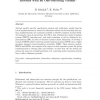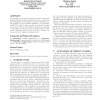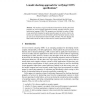38 search results - page 2 / 8 » The meaning of Negative Premises in Transition System Specif... |
JLP
2008
13 years 5 months ago
2008
models, used for specification, analysis and verification, usually describe sets of implementations by means of a refinement relation. In the branching time setting, implementatio...
FAC
2010
13 years 2 months ago
2010
Code and design smells are recurring design problems in software systems that must be identified to avoid their possible negative consequences on development and maintenance. Conse...
ESORICS
2008
Springer
13 years 7 months ago
2008
Springer
The UML is the de facto standard for system specification, but offers little specialized support for the specification and analysis of policies. This paper presents Deontic STAIRS,...
SIGSOFT
2007
ACM
14 years 6 months ago
2007
ACM
In this paper we propose a behavioural model, namely the Extended Modal Labeled Transition Systems, as a basis for the formalization of the different notions of variability usuall...
FASE
2008
Springer
13 years 7 months ago
2008
Springer
We introduce a logical verification framework for checking functional properties of service-oriented applications formally specified using the service specification language COWS. ...



